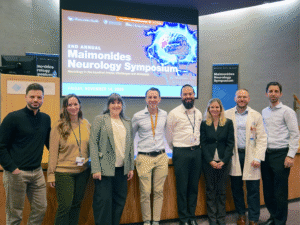David Spitzer, a Borough Park resident, electrician, father, and volunteer EMT with Boro Park Hatzolah, was on his way home from synagogue around 7 p.m. on Wednesday, March 1 when he suddenly collapsed. Later, he was assessed as suffering a heart attack that resulted from an almost total blockage of the left anterior descending artery — the heart’s largest artery — which provides the heart muscle with more than half of its total blood supply. Such an event is called a “widow maker” for its low survival rate.
What could have been a terrible tragedy turned into miraculous recovery thanks to the synergistic care of Maimonides doctors and Hatzolah.
Immediate Care Made a Difference in Saving Mr. Spitzer
Just as Mr. Spitzer had collapsed, Dr. Alexandra Dadrat, a medical resident in Maimonides Medical Center’s Department of Obstetrics & Gynecology, was preparing to leave her shift at her office near the medical center. Someone who witnessed Mr. Spitzer fall came in looking for a doctor to help, and Dr. Dadrat rushed out to take action. After a quick assessment, she confirmed that he had no heartbeat.
She immediately started CPR and instructed an onlooker to call for EMS. Less than two minutes later, Boro Park Hatzolah arrived. Mr. Spitzer’s fellow Hatzolah volunteers, Nachman Feig, a paramedic with Hatzolah for 10 years, and Motty Flesicher, an EMT since 2006, quickly applied an AED, shocked him, and moved him to the ambulance.
“We regained a pulse right away after giving him two shocks,” said Motty Flesicher. “It’s a great feeling to save a life. I definitely think early CPR gave him a better chance.”
Meanwhile, Mr. Spitzer’s family saw that someone had collapsed outside their home on 47th Street and was getting medical help, but had no idea it was Mr. Spitzer. He had just been home, after all, for dinner before he went to evening prayers.
With Short Warning, Maimonides Clinicians Were Prepared
The Hatzolah team called ahead to the Maimonides Emergency Department, which was just two blocks away, to notify them of their impending arrival. Then, they started an IV line to prepare Mr. Spitzer for treatment in the emergency room.
When they reached the hospital, the Maimonides team was prepared to give Mr. Spitzer his best chance of survival. Maimonides treats more heart attacks than any other hospital in New York City while consistently delivering excellent patient outcomes. With short notice, Mr. Spitzer’s care team was ready and waiting to do their part to save his life.
That Wednesday evening, Mr. Spitzer was admitted to Maimonides’ Cardiothoracic Intensive Care Unit, where Jacob Shani, MD, led the interventional cardiology team in performing a percutaneous coronary intervention.
Thanks to the extraordinary expertise and experience of these Maimonides clinicians, the intervention was a success. Maimonides interventional cardiologists are recognized as top performers for all categories of coronary interventions, with superior patient outcomes in both emergency and non-emergency coronary interventions. By Friday, doctors were able to begin to take Mr. Spitzer off of sedative therapies, and he regained consciousness and alertness over the weekend.
“The doctors and nurses were amazing,” said Nachman Feig. “They took it to the next level.”
Highly Efficient Collaboration and Community Care Saves Lives
Thanks to the combination of early CPR by Dr. Dadrat, early defibrillation by the Hatzolah team, and early emergency intervention by the Maimonides Emergency Department, Mr. Spitzer’s life was saved. This exceptional partnership between Maimonides and Hatzolah saves lives every day. These relationships and synergies in the emergency response chain allow for quick action and ultimately, improved patient outcomes.
“This is a man with a large family. If this happened in a different neighborhood, it could have been devastating,” said Motty Flesicher. “Hatzolah was there, the hospital is right there, and the doctor happened to be nearby.”
At an event at Maimonides on June 1, Mr. Spitzer and his family were able to personally thank Dr. Dadrat for her lifesaving actions, and share their story with the community to reinforce the benefits of widespread CPR skills education.
“This entire experience reflects the significance of a community that cares for one another,” said Ken Gibbs, President, and CEO of Maimonides Health. “From the quick thinking of Dr. Dadrat, to the skill of Hatzalah’s EMTs and paramedics, to their transfer of Mr. Spitzer to the care of our Maimonides emergency medicine and cardiovascular experts, this was a wonderful example of collaboration that literally saves lives.”
For more information on Maimonides’ world-class cardiovascular services, visit https://maimo.org/treatments-care/heart-vascular-institute/.







